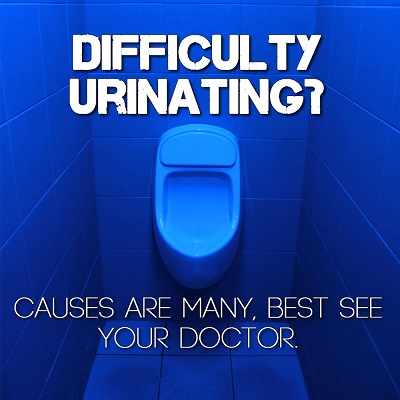 Urinating is one of the natural functions of your body and normally you shouldn’t have any problems getting the job done. Unfortunately, sometimes you can’t urinate even if you have the urge to do so.
Urinating is one of the natural functions of your body and normally you shouldn’t have any problems getting the job done. Unfortunately, sometimes you can’t urinate even if you have the urge to do so.
The Symptoms
- Pain while urinating
- Nausea and vomiting
- Fever and chills
- Blood in urine
- Unable to urinate despite the strong urge to go.
When this happens, what’s causing the problem?
Possible Causes
When you are having difficulty urinating, you’re most likely suffering from a condition that’s affecting your urinary tract. The common triggers are:
Urinary Incontinence
Urinary incontinence, which affects both men and women, is a condition wherein you have little or no control over your bladder. It may be due to obesity, weak muscles, or when your brain sends wrong signals to your bladder that you need to urinate, or when your body produces too much urine. Men with urinary incontinence usually suffer from other contributing medical problems, such as prostate cancer or enlarged prostates.
Urinary Tract Infection
Problems urinating may also be due to a urinary tract infection. This condition can affect any part of your urinary system, but in most cases, it’s the lower urinary tract.
Prostate Problems
Men who have problems with their prostate glands, such as inflamed or enlarged prostates, and prostate cancer, usually suffer from difficulty passing urine.
Diabetes
When you have diabetes, your kidneys work double-time to remove the excess sugar in your bloodstream. That’s why diabetic patients feel thirsty all the time, and as a result, they drink more water and urinate more frequently.
Blockage In the Urinary System
Any form of blockage in your urinary system may lead to problems when urinating. A kidney stone, heart problems, as well as benign or malignant tumors, can make it hard for you to urinate effectively.
Kidney stones may cause you to urinate more frequently or produce small amounts of urine even if you have a strong urge to urinate. Your urine may look pinkish, brownish, reddish, or cloudy.
Fallen Bladder
The weakening of the wall between the bladder and the vagina may lead to urinary incontinence.
Treatment for Difficulty in Urinating
There are medications used to treat problems in urination. Dutasteride is primarily used to treat benign prostatic hyperplasia but can also help reduce urine retention. Finasteride treats enlarged prostate, which can block the flow of urine, thereby causing difficulty in urinating. Consult your doctor first before using any over-the-counter medications.
Avoid holding your urine in. Urinate right away whenever you feel the urge and never rush when urinating. You can try applying pressure over your bladder so that you can empty it as much as you can. You may also apply a hot compress or take a warm shower to aid urination. Don’t drink alcoholic beverages or caffeinated drinks before bedtime.
When to See a Doctor
Difficulty urinating is a common problem doctors have to treat. They have to determine whether it is urinary incontinence, a urinary tract infection, prostate problems, or other causes. As you cannot diagnose the cause yourself, it’s essential to consult your doctor.
If you notice unusual changes to the flow, amount, and color of your urine, call your doctor. It’s all the more important to consult your doctor if you have a fever, chills, and back pain.
Your health care provider will take your medical history and conduct a thorough physical examination to determine the possible cause of the problem. You may also be asked to undergo certain exams like cystoscopy, bladder scan, urinalysis, urine culture, urethral swab, or cystometrogram.
If you find it difficult to urinate for more than 24 hours, call your healthcare professional immediately so that you can get the appropriate treatment.
Passing less than two cups of urine per day is not normal. Although severe dehydration may cause low urine production, it can also be a sign of a complicated health concern. If you are regularly passing low volumes of urine and you are hydrating adequately, make an appointment to see your doctor because your condition may be due to severe kidney problems. This applies to both men and women.






